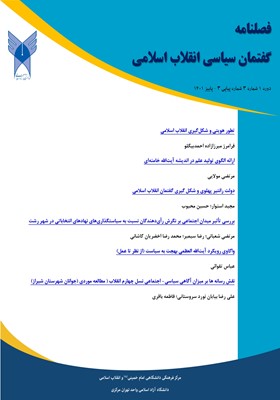دولت رانتیر پهلوی و شکل گیری گفتمان انقلاب اسلامی
محورهای موضوعی : فلسفه سیاسی انقلاب اسلامی
1 - استادیار گروه علوم سیاسی دانشگاه آزاد اسلامی واحد رشت
2 - دانش آموخته کارشناسی ارشد علوم سیاسی
کلید واژه: انقلاب اسلامی, نفت, امام خمینی, دولت رانتیر, رژیم پهلوی دوم,
چکیده مقاله :
بررسی موضوع دولت رانتیر از چشم اندازهای گوناگون برای درک عملکرد دولت رانتیر پهلوی ضروری است. نوآوری پژوهش حاضر بررسی تاثیر دولت رانتیر بر تغییر میدان سیاسی و اجتماعی دهه ۵۰ شمسی و برساخت گفتمان انقلاب اسلامی با محوریت امام خمینی (ره) می باشد. بنابراین هدف این پژوهش، تلاش در جهت تبیین تاثیر دولت رانتیر پهلوی در شکل گیری گفتمان انقلاب اسلامی ایران است. پرسش اصلی پژوهش حاضر این است که چرا دولت رانتیر پهلوی دوم در ایران در اجرای سیاست توسعه ای خود ناکام ماند و انقلاب اسلامی ایران پدیدار شد؟ در پاسخ به پرسش اصلی پژوهش حاضر، پس از مباحث نظری، عملکرد توسعه ای آن دولت در ایران مورد بررسی قرار گرفت. یافته های پژوهش نشان می دهد که عملکرد دولت رانتیر پهلوی، موجب تغییر میدان سیاسی و اجتماعی دهه ۵۰ شمسی و پیدایش تقاضاهای جدید سیاسی، اجتماعی و اقتصادی در جامعه شد. گفتمان انقلاب آفرین امام خمینی (ره) از مهم ترین پیامدهای عملکرد دولت رانتیر در این دهه بود. روش پژوهش کیفی و به شیوه بررسی تاریخی انجام شده است.
Examining the issue of the rentier government from different perspectives is necessary to understand the functioning of the Pahlavi rentier government. The innovation of the current research is to examine the impact of the rentier government on the change of the political and social field of the 1950s and the construction of the discourse of the Islamic Revolution centered on Imam Khomeini (RA). Therefore, the purpose of this research is to try to explain the influence of the Pahlavi rentier government in the formation of the discourse of the Islamic Revolution of Iran. The main question of the current research is why the Pahlavi II rentier government in Iran failed to implement its development policy and the Islamic Revolution of Iran emerged? In response to the main question of the current research, after theoretical discussions, the development performance of that government in Iran was examined. The findings of the research show that the performance of the rentier Pahlavi government changed the political and social field of the 1950s and the emergence of new political, social and economic demands in the society. Imam Khomeini's revolutionary speech was one of the most important consequences of the rentier government's performance in this decade. The method of qualitative research is done in the way of historical investigation.
_||_


